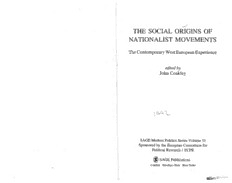
The Social Origins of Nationalist Movements: The Contemporary West European Experience (SAGE Modern Politics series) PDF
127 Pages·1992·13.459 MB·English
Most books are stored in the elastic cloud where traffic is expensive. For this reason, we have a limit on daily download.
Preview The Social Origins of Nationalist Movements: The Contemporary West European Experience (SAGE Modern Politics series)
Description:
This review of the social origins of nationalism and of contemporary nationalist movements in western Europe provides new insights into the European politics at a time when nationalist fervour is making a significant comeback.The object of this book is to bring the key theoretical perspectives to bear on the social context within which nationalist movements arise, and to evaluate the empirical evidence from a number of case histories.General theoretical analyses of the links between nationalist movements and social factors are addressed in the first two chapters, while the following two chapters explore the conflicting pressures of class and ethnicity as determinants of the process of political mobilization.The remaining chapters are case studies relating to particular regions or minorities within the context of a larger state including the Jura, Sardinia, Brittany, Scotland and Northern Ireland. The Nordic region, by contrast, illustrates a case where the prerequisites of nationalist agitation are present, but where vigourous nationalist movements have been strikingly absent.This study of the social origins of nationalist movements will be of value to readers interested in the human sciences, especially political scientists, sociologists and historians, as well as those interested in ethnic studies and European studies.
See more
The list of books you might like
Most books are stored in the elastic cloud where traffic is expensive. For this reason, we have a limit on daily download.
